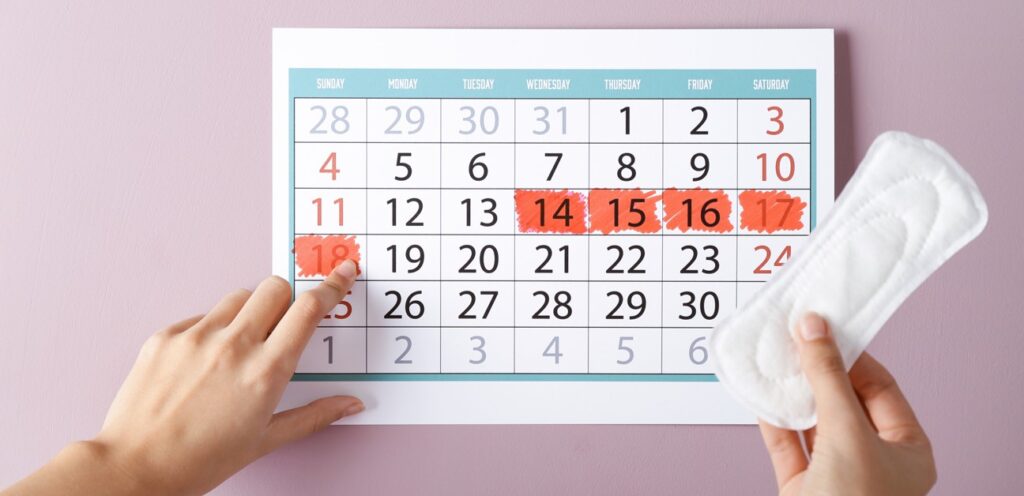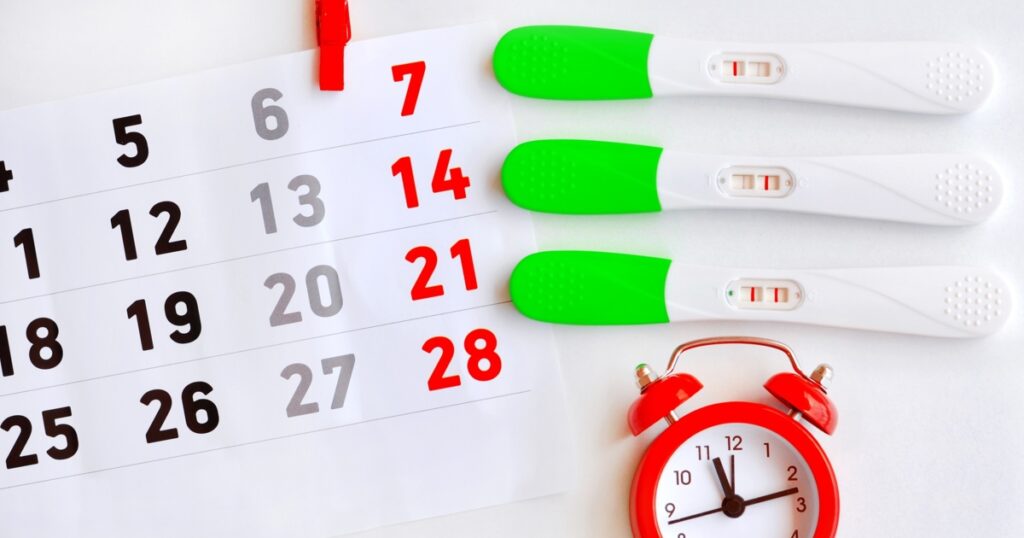When it comes to understanding the intricate relationship between our sexual health and menstrual cycles, numerous questions and myths often cloud our judgment. The topic of whether sexual activity can affect one’s menstrual cycle is surrounded by a blend of anecdotal evidence, scientific research, and cultural beliefs. This makes it crucial for women, especially those who menstruate, to demystify the connection between sex and periods.
The menstrual cycle, a vital sign of reproductive health, can be influenced by a myriad of factors including stress, hormonal changes, lifestyle adjustments, and potentially, sexual activity. Understanding these influences is paramount in recognizing when variations in the cycle are normal and when they might indicate a need for medical advice.
In this guide, we will delve into the scientific underpinnings of how sex might influence menstrual cycles, debunk prevalent myths, and shine a light on facts. From hormonal fluctuations brought on by sexual arousal and orgasm, to the physical impact of sex on the uterus, we’ll cover a range of aspects that link sexual activity with menstrual health. Moreover, we’ll discuss the topic of having sex during menstruation, addressing common concerns and highlighting the benefits and precautions associated with it.
Recommended: Does Ovulation Make You Emotional?
Through this comprehensive exploration, our goal is to offer insights that foster a better understanding of the body’s responses to sexual activity and how it relates to the menstrual cycle. By equipping you with accurate information, we hope to encourage open, healthy discussions about sexual and menstrual health, paving the way for a more informed and empowered approach to managing your well-being.
Understanding the Menstrual Cycle
The menstrual cycle is a natural, complex process that occurs in the female reproductive system. It’s essential for reproduction, governed by the ebb and flow of hormones, and is unique to each individual. To fully grasp how sexual activity might influence this cycle, it’s important first to understand its basics, its phases, and the hormonal orchestra that regulates it.
The Basics of the Menstrual Cycle
At its core, the menstrual cycle prepares the body for pregnancy each month. It involves the thickening of the uterine lining, the release of an egg (ovulation), and the shedding of the uterine lining if pregnancy doesn’t occur (menstruation). The cycle’s length can vary significantly among individuals, typically ranging from 21 to 35 days, with menstruation lasting from 2 to 7 days.
Recommended: Can You Drink Alcohol After Taking Abortion Pill?
Key Phases of the Menstrual Cycle
- Menstrual Phase (Day 1-5): This phase starts on the first day of menstruation, where the lining of the uterus (endometrium) breaks down and is shed, leading to bleeding. It marks the beginning of a new cycle.
- Follicular Phase (Day 1-13): Overlapping with the menstrual phase, this phase involves the pituitary gland releasing follicle-stimulating hormone (FSH). FSH stimulates the ovaries to produce around 5 to 20 tiny sacs called follicles. Each follicle contains an egg. Typically, only one follicle, the dominant one, will mature into an ovum (egg), while the others regress.
- Ovulation (Day 14): Triggered by a surge in luteinizing hormone (LH), ovulation occurs mid-cycle. The mature egg is released from the ovary and travels down the fallopian tube, making it possible to be fertilized by sperm.
- Luteal Phase (Day 15-28): After the egg is released, the empty follicle transforms into a structure called the corpus luteum, which secretes progesterone. Progesterone prepares the uterine lining for a potential pregnancy. If the egg is not fertilized, the corpus luteum breaks down, leading to a drop in progesterone and estrogen levels, and the cycle begins anew with the menstrual phase.

Hormonal Changes
The menstrual cycle is regulated by a delicate balance of hormones, primarily estrogen and progesterone, produced by the ovaries, as well as LH and FSH from the pituitary gland. These hormones orchestrate the growth and shedding of the uterine lining and the release of the egg, playing pivotal roles in each phase of the cycle.
Recommended: Can a Woman Have an Orgasm After Menopause?
Understanding these phases and hormonal changes is crucial for recognizing how external factors, including sexual activity, might impact the menstrual cycle. While the direct effects of sex on this complex hormonal interplay are nuanced, being aware of the cycle’s basics allows for a deeper comprehension of the potential connections and variations one might experience.
Does Sex Affect Periods?
Yes, sexual activity can have various effects on menstrual cycles, although it does not typically affect the fundamental process of menstruation itself. Here are several ways in which sexual activity might influence menstrual cycles or experiences:
- Orgasm: Sexual arousal and orgasm can lead to muscular contractions in the pelvic area, which might temporarily relieve menstrual cramps for some individuals. This is due to the release of endorphins, which are natural painkillers and mood enhancers.
- Menstrual Flow: For some, sexual activity during menstruation can seem to increase menstrual flow. This is because sexual activity can lead to the expansion of the cervix, potentially causing the uterus to expel menstrual blood more quickly.
- Irregular Periods: While sexual activity itself doesn’t directly cause irregular periods, the stress or emotional issues related to one’s sexual life could potentially influence menstrual cycles indirectly. Stress can affect the hypothalamus — the part of the brain responsible for regulating some hormones that control the menstrual cycle.
- Pregnancy and Amenorrhea: Obviously, heterosexual intercourse can lead to pregnancy, which results in the cessation of menstrual periods during the gestation period. Furthermore, breastfeeding after pregnancy can also delay the return of regular menstrual cycles in a condition known as lactational amenorrhea.
- Sexually Transmitted Infections (STIs): Contracting STIs can lead to irregularities in menstrual cycles and other reproductive health issues. For example, conditions like pelvic inflammatory disease (PID), often caused by untreated STIs, can lead to irregular periods among other symptoms.
- Hormonal Fluctuations: Emotional intimacy and physical closeness associated with a sexual relationship can influence hormone levels, potentially impacting menstrual cycles. However, these effects are more subtle and less direct.
- Contraceptives: Engaging in sexual activity may lead to the use of hormonal contraceptives, which directly affect menstrual cycles. Birth control pills, patches, IUDs, and injections can alter the regularity, frequency, and heaviness of menstrual bleeding.
Recommended: Does Family Planning Affect Future Pregnancy?
It’s important to note that while sexual activity can influence aspects of the menstrual cycle or experience, any significant changes or irregularities should be discussed with a healthcare provider to rule out underlying health issues.
The Impact of Sex on the Menstrual Cycle
The intersection of sexual activity and the menstrual cycle is a topic ripe with myths, misconceptions, and a sprinkle of truth. To demystify this connection, it’s crucial to explore how and why sexual activity might influence menstrual patterns, drawing upon both scientific insights and common experiences.
Hormonal Fluctuations Due to Sexual Arousal and Orgasm
Sexual arousal and orgasm can lead to temporary hormonal changes in the body. During sexual activity, the body experiences an increase in certain hormones, including oxytocin and dopamine, which are associated with pleasure and bonding. Additionally, the release of endorphins, the body’s natural painkillers, can lead to a feeling of well-being.
While these hormonal shifts are temporary, they can have a short-term impact on the menstrual cycle. For instance, the release of oxytocin during orgasm has been speculated to help in the regulation of menstrual cycles by potentially influencing the timing of ovulation, although more research is needed to fully understand this relationship.

Physical Changes in the Uterus During and After Sex
Sexual activity, especially leading to orgasm, can cause contractions in the uterus. These contractions are not just part of the sexual response but may also play a role in menstrual health. There is anecdotal evidence suggesting that uterine contractions during orgasm can help in the expulsion of menstrual blood, possibly leading to shorter or less painful periods. However, the scientific community requires more robust evidence to confirm these effects conclusively.
The Possibility of Sex-Inducing Periods
A common question is whether sex can induce a period. While there is no direct scientific evidence to confirm that sexual activity can trigger menstruation, the physical stimulation of the cervix and the uterus during sex might lead to slight changes in the body that could potentially hasten the onset of a period, especially if it is already due. This is thought to be due to the increased blood flow to the pelvic area and the uterine contractions that occur during orgasm, which might help the uterus begin the process of shedding its lining.
Debunking Myths and Clarifying Facts
| Myth | Fact |
| Having sex can delay your period or stop it altogether. | Regular sexual activity does not delay or stop periods. However, stress, hormonal changes, and other external factors can influence cycle regularity and are often confused with the impact of sexual activity. |
| You cannot get pregnant if you have sex during your period. | While it’s less likely, it’s still possible to conceive from sex during your period, especially in shorter cycles where ovulation occurs soon after menstruation. |
Understanding the potential impact of sex on the menstrual cycle requires a nuanced approach, recognizing the complex interplay of hormones, physical responses, and individual variations. While certain aspects of sexual activity may influence menstrual patterns, it’s essential to consider the broader physiological and psychological context. Further research is needed to fully elucidate these connections, and individuals are encouraged to observe and discuss any significant changes in their menstrual cycles with healthcare professionals.
Recommended: How Soon After Tubal Reversal Can I Try To Conceive?
Sex During Your Period: What You Need to Know
Engaging in sexual activity during menstruation is a topic often shrouded in taboo and misinformation. However, it’s a perfectly natural behavior with its own set of considerations. Here, we aim to debunk common myths, highlight the benefits, and discuss precautions to ensure a positive and safe experience.
Debunking Common Myths
| Myth | Fact |
| Sex during menstruation is unhealthy or unsafe. | Sex during your period is safe and can be engaged in as long as both partners are comfortable with the idea. It’s a natural part of sexual life for many people. |
| You cannot get pregnant if you have sex during your period. | Although the likelihood is lower, it’s still possible to conceive from sex during menstruation, particularly for those with shorter or irregular cycles. |
Benefits of Sex During Periods
- Pain Relief: Orgasms can act as a natural pain reliever. The contractions of an orgasm may help to alleviate menstrual cramps through the release of endorphins, the body’s natural painkillers.
- Improved Mood: Sexual activity increases the release of endorphins and other hormones like oxytocin, often leading to improved mood and a reduction in the symptoms of premenstrual syndrome (PMS).
- Shorter Periods: There is anecdotal evidence to suggest that sex during menstruation can lead to shorter periods. The contractions of the uterus during orgasm might help to expel menstrual blood faster, though more scientific research is needed to confirm this effect.
Precautions and Hygiene Practices
- Use Protection: To minimize the risk of sexually transmitted infections (STIs) and unwanted pregnancy, it’s crucial to use protection, such as condoms, even during menstruation. The risk of transmitting or contracting STIs may be higher during this time due to the presence of blood.
- Maintain Hygiene: Given the presence of menstrual blood, maintaining hygiene is essential. You might want to lay down towels or use a waterproof cover to protect bedding and consider showering or cleaning up before and after sex.
- Open Communication: Discuss comfort levels, preferences, and any concerns with your partner. Open communication can enhance intimacy and ensure that the experience is positive for everyone involved.
When to Consult a Healthcare Provider
If you experience significant discomfort during sex, notice unusual symptoms (such as excessive bleeding or foul-smelling discharge), or if you have concerns about STIs or pregnancy, it’s important to consult a healthcare provider. They can offer personalized advice and address any health issues that may arise.
Recommended: Top 6 Signs Of Poor Egg Quality You Should Know
Engaging in sexual activity during menstruation is a personal choice and can be a normal part of one’s sexual and reproductive health. By understanding the myths, benefits, and necessary precautions, individuals can make informed decisions that best suit their comfort levels and health needs.

Can Sexual Activity Delay Your Period?
Sexual activity itself typically does not delay your menstrual cycle. The timing of your period is primarily governed by your hormonal balance, which is influenced by a complex interaction of factors including your brain (specifically the hypothalamus and pituitary gland), ovaries, and other health or lifestyle factors.
However, there are indirect ways sexual activity might seem to be related to a delay in your period, including:
1. Stress and Its Role
Engaging in sexual activity, especially if it’s associated with anxiety about pregnancy or relationship issues, can lead to stress. Chronic stress is known to affect the hypothalamus—the part of the brain that regulates hormones controlling the menstrual cycle. This disruption can lead to delayed or missed periods. It’s the stress associated with sexual activity, rather than the act itself, that can have an impact on your cycle.
2. Hormonal Changes and Contraception
The use of emergency contraceptive pills (ECPs) after unprotected sex can lead to changes in the menstrual cycle. These pills contain high doses of hormones that prevent pregnancy, which can temporarily alter cycle regularity, causing periods to come earlier, later, or be heavier than usual.
Regular use of hormonal contraceptives (e.g., the pill, patch, or ring) can also impact menstrual cycles. While these methods are designed to regulate periods, starting, stopping, or changing birth control methods can lead to adjustments in the cycle, including delayed periods.
3. Pregnancy Considerations
Naturally, one of the most direct connections between sexual activity and delayed periods is pregnancy. If you have had unprotected sex and your period is late, it’s important to take a pregnancy test to determine if pregnancy is the reason for the delay.
4. Psychological Factors
Sometimes, the mere anticipation or anxiety over a potential pregnancy can cause enough stress to delay your period, creating a cycle of stress and delay that exacerbates the situation.
When to Consult a Healthcare Provider
If your period is significantly late and you’ve ruled out pregnancy, or if you’re experiencing consistently irregular cycles, it’s a good idea to consult a healthcare provider. They can help identify any underlying conditions that may be affecting your menstrual health, such as polycystic ovary syndrome (PCOS), thyroid disorders, or other hormonal imbalances.
Recommended: How To Get Rid Of Smelly Discharge During Pregnancy
In summary, while sexual activity itself is not a direct cause of delayed periods, the circumstances surrounding it—such as stress, the use of emergency contraception, changes in hormonal birth control methods, and the possibility of pregnancy—can have an indirect effect on menstrual regularity. Understanding these factors can help individuals better navigate their sexual and reproductive health, ensuring they seek appropriate care and advice when needed.

Sex, Conception, and Periods
The interplay between sexual activity, conception, and menstrual cycles is a foundation of reproductive health. Understanding how these elements interact can provide invaluable insights into fertility, the timing of conception, and what changes in menstrual patterns might signify in the context of trying to conceive or avoiding pregnancy.
Understanding Fertility Windows
- Ovulation and Fertility: The most fertile period of a person’s cycle centers around ovulation when an egg is released from the ovary and is available to be fertilized by sperm. This typically occurs around day 14 of a 28-day cycle but can vary widely among individuals and from cycle to cycle. Sperm can live inside the female reproductive tract for up to 5 days, and the egg remains viable for about 24 hours post-ovulation. Therefore, the fertility window is often considered to be the 5 days leading up to and including the day of ovulation.
- Tracking Ovulation: Understanding when ovulation occurs can help in planning or preventing pregnancy. Methods to track ovulation include monitoring basal body temperature, observing changes in cervical mucus, and using ovulation predictor kits.
The Role of Sexual Activity in Conception
- Timing and Frequency: For those trying to conceive, timing sexual activity during the fertility window can increase the chances of pregnancy. However, it’s also important to maintain a healthy frequency of sexual activity outside the fertility window to support optimal sperm health and maintain intimacy in the relationship.
- Impact on Menstrual Cycles: Regular sexual activity does not typically alter menstrual cycles directly. However, the stress or changes in lifestyle associated with trying to conceive can affect menstrual regularity.
Menstrual Cycles as Pregnancy Indicators
- Missed Periods: The most common early sign of pregnancy is a missed period. If you have a regular menstrual cycle and miss a period, it’s advisable to take a pregnancy test. Keep in mind that other factors, such as stress, illness, and hormonal imbalances, can also cause missed periods.
- Implantation Bleeding: Some individuals experience light spotting known as implantation bleeding, which occurs when the fertilized egg attaches to the lining of the uterus. This can sometimes be confused with a light period.
Considering Health and Lifestyle Factors
- Overall Health: General health, including physical, emotional, and mental well-being, can influence fertility, sexual activity, and menstrual cycles. A balanced diet, regular exercise, and managing stress can support reproductive health.
- Lifestyle Changes for Conception: For those trying to conceive, reducing alcohol and caffeine intake, quitting smoking, and avoiding certain medications can improve the chances of conception and support a healthy pregnancy.
When to Seek Help
- Fertility Concerns: Couples who have been trying to conceive for over a year without success (or six months if the woman is over 35) should consult a healthcare provider. They can offer fertility evaluations and discuss potential treatments.
- Irregular Cycles and Conception: If menstrual cycles are irregular, seeking medical advice can help identify any underlying issues that may affect fertility. Conditions like PCOS, thyroid disorders, and others can impact menstrual regularity and fertility.
Recommended: 10 Best Vitamins For Hormonal Acne
Understanding the connections between sex, conception, and periods can empower individuals and couples in their reproductive journeys, whether they are trying to conceive, avoiding pregnancy, or simply seeking to understand their bodies better. Armed with this knowledge, they can make informed decisions and seek appropriate support when needed.
FAQs
Is it safe to have sex during my period?
Yes, it is safe to have sex during your period as long as both partners are comfortable with it. Using protection is recommended to reduce the risk of transmitting or contracting sexually transmitted infections (STIs) and to manage hygiene.
Can sex during menstruation increase the risk of infections?
The risk of transmitting and contracting STIs may be slightly higher during menstruation due to the presence of blood. It’s important to use protection, such as condoms, to minimize this risk.
Can orgasm affect menstrual cramps?
Yes, orgasms can help alleviate menstrual cramps for some individuals. The release of endorphins during orgasm acts as a natural pain reliever and muscle relaxant, potentially reducing cramp severity.
Is it possible to get pregnant if you have sex during your period?
While it’s less likely, it is still possible to conceive from sex during your period, particularly for those with shorter or irregular cycles where ovulation occurs soon after menstruation ends.
Can changes in sexual activity lead to irregular periods?
Sexual activity itself does not cause irregular periods. However, factors associated with sexual activity, such as stress, changes in contraception, or underlying health concerns, can impact menstrual regularity.
Conclusion
The relationship between sex and menstrual cycles is complex and influenced by physiological, psychological, and hormonal factors. While sexual activity can have indirect effects on menstrual regularity through stress, contraception use, and the potential for conception, it does not directly alter menstrual cycles. Understanding these dynamics is crucial for reproductive health and well-being.
Women experiencing concerns about their menstrual cycle or fertility should consult healthcare professionals. Ultimately, fostering open communication about sexual health and menstrual experiences can demystify misconceptions and empower individuals to make informed decisions about their reproductive health.
